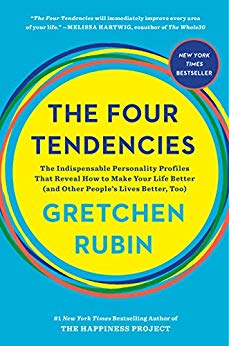

This article is an excerpt from the Shortform summary of "The Four Tendencies" by Gretchen Rubin. Shortform has the world's best summaries of books you should be reading.
Like this article? Sign up for a free trial here .
What is the Questioner tendency from Gretchen Rubin’s The Four Tendencies like? How do they behave, and what’s the Questioner Personality?
People with the Questioner tendency typically need justification if you ask them to perform a task, otherwise, they may not do it. Their strength is that—if they decide a request is justified—they will reliably get tasks done, they are efficient, and they innovate. Their weaknesses are that they are stubborn, they over-think everything, and they often fall into decision-paralysis.
Learn more about Questioners below.
Overview of the Questioner Tendency
Questioners readily respond to internal expectations, but not external expectations. They’re committed to logic, information, and efficiency, and refuse arbitrary, inefficient, or illogical expectations. They gather information, then make their own decisions and act with good reason. The Questioner responds best to her own internal expectations because she’s already thought through these expectations and made sure they’re justified, achievable, and logical.
External expectations need to be justified—once they are, the Questioner will view them as internal expectations and will have little trouble fulfilling them. For example, a Questioner might receive a text from her husband asking her to pick up lunch meat on her way home. If that’s all the text says, the Questioner might not do it: her husband can pick up lunch meat if he really wants it, they have plenty of other food in the house. But if the husband texts that they need lunch meat because their daughter has two field trips that week and needs bagged lunches, the Questioner will do it: now it makes sense and has justification.
Strengths of Questioners
As long as the expectation makes sense to them, they have the self-direction of an Upholder, the reliability of an Obliger, and the authenticity of a Rebel. Once Questioners decide to act, they follow-through without difficulty. If they don’t agree with an external expectation, they resist it without stress or guilt.
They make up their own minds and question every expectation to make sure it’s justified. They question the most widely accepted and basic assumptions, and can often create change for the better on both a small and large scale. They help themselves, others, and organizations act with as much justification as possible.
Because they value efficiency and logic, they want to improve any process they’re involved in (unless it’s perfect in their eyes—which probably means they designed it themselves). Doing things the wrong way or a harder way is unacceptable in a Questioner’s mind, and they’ll work tirelessly to improve systems.
They do thorough and exhaustive research, and make well-considered decisions because of it. Because of this, Questioners also serve as resources for others, and enjoy sharing their knowledge.
People with the Questioner tendency do well in careers that are research or systems-heavy, such as auditors, municipal planners, and scientists.
Some other positive descriptions of Questioners:
- Fair-minded
- Efficient
- Buck systems and trends
- Refuse authority without justification
- Data-driven
- Good devil’s advocate
Weaknesses of Questioners
According to Gretchen Rubin, Questioners’ refusal to meet expectations without reason can sometimes lead to trouble, particularly in school where students are expected to do things simply because the teachers ask them to. Others often find their questions tiring and obstructive, and feel like they raise needless questions and refuse to respect authority.
People with the Questioner tendency often view their own thought patterns as normal, and get frustrated when others don’t think the same way. They get annoyed when people fulfill expectations that seem illogical or unjustified, and they get annoyed when people get annoyed with their questions.
Constantly questioning everything can be exhausting for the Questioner themselves. Rarely is an answer ever good enough unless the Questioner comes to it on his own, which means the Questioner has to do a lot of heavy mental lifting to feel good enough about something to finally act on it. Some Questioners report wanting to be satisfied with basic answers, but needing more and more information to satisfy themselves.
And because of their extensive research and desire to make the best-considered decision, Questioners can sometimes fall into analysis-paralysis, where they become incapable of making a decision because they keep researching or the research doesn’t clearly point in one direction. We’ll discuss how to combat analysis-paralysis in a later section.
Careerwise, Questioners might be happy starting their own business so they can do things their own way, but if a Questioner easily falls into analysis-paralysis, they won’t be able to make the big decisions necessary to manage their own business. They also do poorly in work environments where people view questions as challenges to authority or insubordination.
People with the Questioner tendency can sometimes fall into crackpot tendencies if their research comes from unfounded sources, or if they make up their minds with information that seems justified but ultimately isn’t. For instance, Rubin suggests that most conspiracy theorists are Questioners.
Lastly, and somewhat ironically, Questioners don’t like being questioned themselves:
- First, they’ll want to know why they should bother answering your question, though this is right in keeping with Questioner tendencies.
- Then, because they’ve already put in the time, energy, and thought and reached a conclusion they feel makes sense, they take it personally if someone challenges their own carefully formed decision, or they don’t want to have to go through all the logic they already exhausted themselves with. They’re happy to provide information on something, but if they feel like someone is challenging their rationale, then they get upset.
- Lastly, Questioners get annoyed especially when other people, who haven’t done any research on a subject, ask what they consider to be dumb questions. Questioners assume other people know the Questioners would have already discovered flaws in their logic or questionable information, so they get annoyed when people ask questions in this vein.
To summarize Questioner weaknesses:
- Impatient with incompetency
- Dislike being questioned
- Refuse to do anything without “good” reasons
- Refuse some helpful social expectations (such as driving the speed limit)
- Analysis-paralysis
Variations on the Questioner
The Questioner can tip Upholder or Rebel.
Upholder Tip
According to Gretchen Rubin, Questioners who tip Upholder generally accept social expectations and rules more easily.
Though their primary allegiance is still to their internal expectations, they’re more likely to fulfill external expectations as well.
(Shortform example: A Questioner with an Upholder tip will be more likely to go along to their spouse’s holiday office party, even if the Questioner doesn’t like socializing or doesn’t understand the point, simply because their spouse cares about it and expects them to go.)
Rebel Tip
Questioners who tip Rebel challenge all expectations with more ferocity. They also generally reject all expectations more often.
(Shortform example: On the other end, a Questioner who tips Rebel will probably openly question why their spouse or anyone else goes to the party at all, and has probably never gone to a holiday office party simply because someone else would like them to.)
Analysis-Paralysis
As we already know, analysis-paralysis happens when a Questioner can’t come to a conclusion, becoming trapped in a paralysis where they can’t make a decision. Either they’ve done so much research that there seems to be no better answer so they aren’t sure how to pull the trigger, or they keep doing more research to see if they can get closer to the best answer in their minds.
People with the Questioner tendency and people around them can do a few things to help avoid analysis-paralysis:
- Limit over-deliberation by setting guidelines on the amount of research or deadlines for a decision.
- Focus on the big goal instead of small deliberations.
- Question your own questioner tendency: “is it helpful to question this much?”
- Ask more questions to gain more clarity on the situation, which will hopefully help you come to a decision.
- Seek out people you admire or sources you respect and follow their lead on a similar issue.
Meeting Unjustified Expectations
According to Gretchen Rubin, Questioners also have trouble meeting any expectations they feel are unjustified—but sometimes, in life, there are good reasons to do so.
Here are 3 tips for helping people with the Questioner tendency meet expectations they don’t want to.
1) It’s logical to meet expectations if someone else really cares about them or if you have a self-interest related to that person.
- For example, if your grandmother expects you to dress a certain way when you come over for dinner, your Questioner tendency might make you resist that expectation. But if you love your grandmother and don’t want her to get upset, it’s actually more efficient to just dress the way she expects and let it go.
2) Focus on the second order of reason…
———End of Preview———

Like what you just read? Read the rest of the world's best summary of Gretchen Rubin's "The Four Tendencies" at Shortform . Learn the book's critical concepts in 20 minutes or less .
Here's what you'll find in our full Four Tendencies summary :
- What the Four Tendencies are, in complete detail
- How to compensate for your tendency's weakness
- Which tendency you pair best with romantically
- How to deal with other people's tendencies






